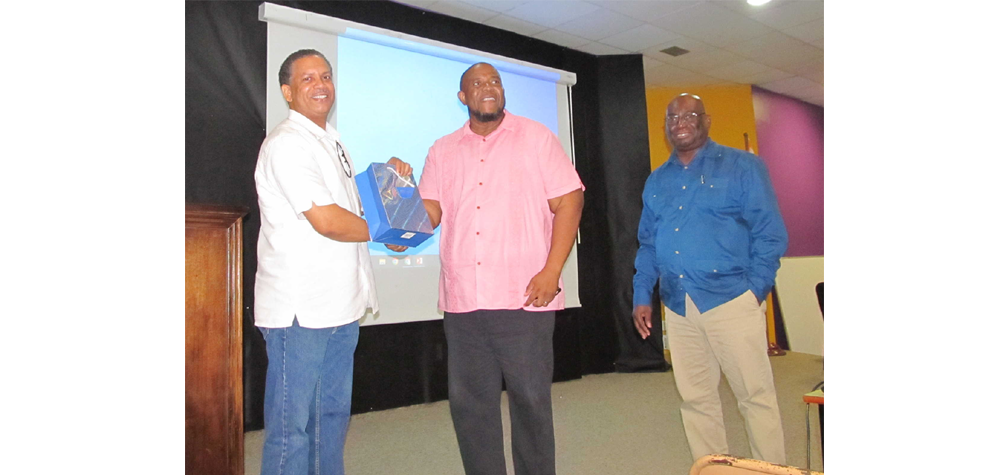Photo: Dr. Dion Daniels, Assistant Professor from the Faculty of Science and Technology at UB, was awarded with a token by Dr. Vincent Palacio, President of the University of Belize and Dr. Bernard Watler, Dean of the Faculty of Management and Social Sciences looks on.
by Orlando Pulido
SANTA ELENA TOWN, Cayo District, Sat. May 4, 2024
The University of Belize (UB) held its 13th Annual Research Conference last Thursday, May 2. The theme selected was “Advancing Research from Theory to Reality”. This year, for the first time, the conference, which did not take place in 2020 and was held online in 2021 due to the pandemic, is featuring the results from cutting-edge research done by both the faculty and undergraduates of the university. The event was hosted by UB’s Faculty of Management and Social Sciences.
In his welcome address, UB president, Dr. Vincent Palacio spoke about ideas taking shape and transforming the world around us. He said that UB was abuzz, and that there were meaningful and exciting developments taking place.
“Our students, particularly our last year Bachelor students, they have to do some research activity, some research in their discipline, and this could be used by the government to guide policy-making,” he told Amandala.
According to Dr. Palacio, students are encountering various challenges such as limited access to data. He told us that “students are struggling to come to school financial-wise [sic] and to have to incur additional expenses for research it is too costly; and third, it’s time-consuming…”
In the keynote address, Dr. Dion Daniels, Associate Professor from UB’s Faculty of Science and Technology, exhibited a floppy disk. He said that he could not find CD-ROMs on computers, and that information was now moving to the “Cloud.”
“In the realm of science and technology, research is the driving force,” said Dr. Daniels.
Whether it is finding solutions to climate change or combating disease, research is the driving force, Dr. Dion Daniels said. He pointed out that coming up with a successful vaccine for COVID-19 required considerable research.
Anthony Middleton, who is currently pursuing a Bachelor’s degree in business at UB, also presented the results of his research on cryptocurrency. He explained that cryptocurrencies exist as digital assets that can be converted to physical currency, but are “volatile.” Based on the results of a survey he conducted using online tools with a sample size of 400 persons, he concluded that cryptocurrencies will affect the traditional banking system.
“A lot of persons had a risky appetite,” he said.
Middleton noted that while El Salvador has adopted cryptocurrencies as legal tender, future researchers need to explore the public’s perspective on it.
Another student doing a presentation on Thursday was Ms. Sasha Brown, who explored the “Stigmatization of Mental Health and Wellness in the Workplace”. Brown posited that stigmatization in the workplace “… creates a formidable barrier to seeking support.”
Some 38.6% of her respondents to the Google Form Questionnaires indicated that they had witnessed stigmatization. An additional 37.5% were reluctant to disclose their mental health concerns. However, 51.1% expressed the belief that addressing mental health should be a priority for the organization.
Interestingly, Dr. Dion Daniels did 12 years of study in Cuba under a scholarship program, arriving there in 1991 amid the country’s economic crisis. There in Cuba, he spent four years working on his PhD in plant biotechnology.
“The shortage of labor is a complex situation, but we have to study why is there a shortage of labor and how we can reverse that trend—brain drain; our professionals are leaving this country to go abroad for other places where there are better opportunities. What can the government do to stop that and keep our professionals right here in Belize to build our nation?” he asked.
Dr. Dion Daniels is now dedicating his time to the science of plant tissue culture. He also conducts courses in biodiversity, genetics, plant biotechnology, and molecular methods at UB. Dr. Daniels informed us that UB is attempting to reopen the micropropagation laboratory in Central Farm because “we have demand in the sugar industry; we have demand in the banana industry; and there are several other areas in the agricultural sector that could do with these micro-propagated plants.”
Dr. Daniels also explained that Belize needs to conserve its germplasm.
“You can have germplasm ex vitro and you can have germplasm in vitro. [In] germplasm ex vitro we can move towards that, but it has its disadvantages — you are conserving germplasm in the outside where they are subject to environmental conditions; if a flood comes, it wipes away your germplasm bank; extreme heat, drought, hurricane — and so the more appropriate thing would [be to] have a germplasm bank in vitro in the lab where you can conserve different varieties of all different species. That would be the ideal thing to do.”
However, the laboratory in Central Farm doesn’t have the necessary facilities for the generation and storage of germplasm in vitro. All the laboratory space in the Central Farm is geared toward producing “vitro plants” to supply the demand in the agricultural sector.
“But it is extremely important that, indeed, we have a germplasm bank in vitro for future demands. We can do an expansion of the lab in Central Farm, so the area that we have, which is the growth room that is for production of vitro plants; but we can expand that so that we have an area that is for conservation of germplasm in vitro,” he recommended.
Dr. Bernard Watler, the Dean of the Faculty of Management and Social Sciences, maintains that the results of research have the potential to transform industries. He challenged students to love research— “… something that you will continue to do beyond the walls of UB.”
On April 17, 2024, UB launched a research-based Master’s Degree program.

